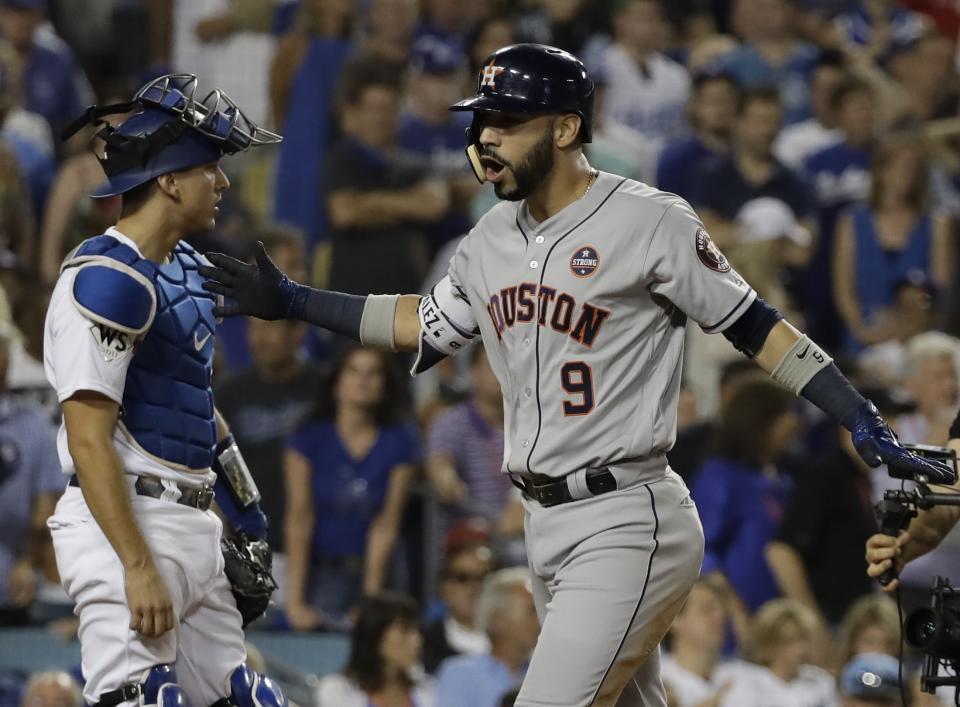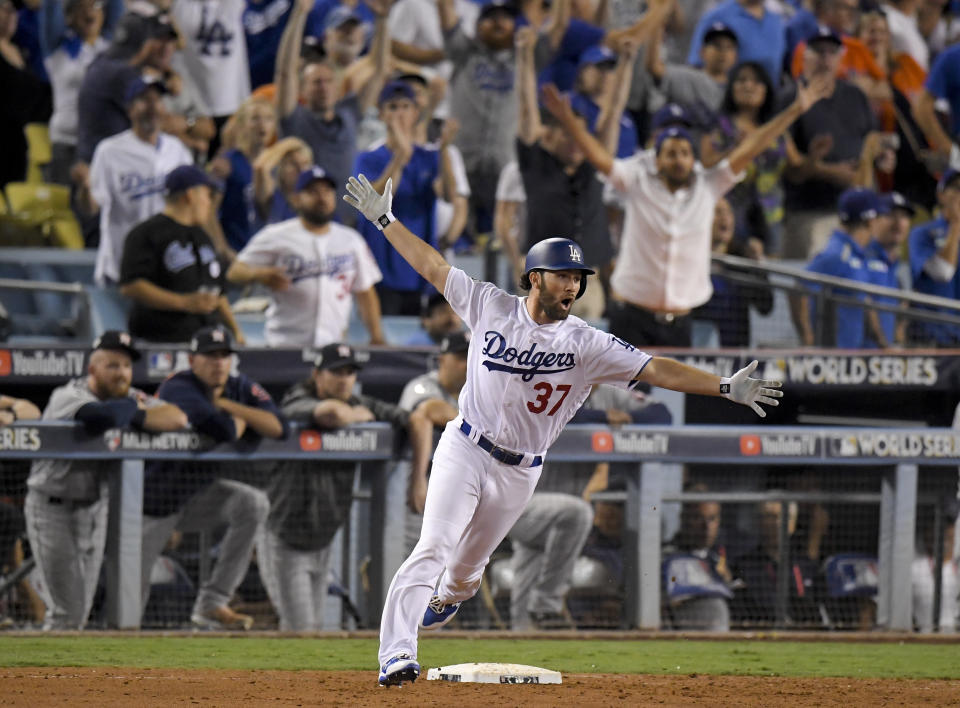How the Houston Astros won an epic, homer-happy World Series Game 2
LOS ANGELES – About an hour after one of the finest games in the 113-year history of the World Series loosened its vise grip on the 38 men who played in it and the 54,293 who witnessed it and the millions lucky enough to watch it, George Springer and Marwin Gonzalez lounged inside the Houston Astros’ clubhouse and tried to make sense of it. There was no sense to be made. Home runs soared and monoliths crumbled and leads evaporated and bats flipped and emotions seesawed and for 4 hours and 19 minutes of October madness, two excellent baseball teams did what two excellent baseball teams are supposed to do, which is play the sort of game that leaves throats sore and words scant.
“We needed that,” Gonzalez said.
“We needed that,” Springer repeated.
They laughed. Both were bushed, drained by the unseasonable heat and the physical exertion of 11 innings and the pure bipolarity of their 7-6 victory against the Los Angeles Dodgers in Game 2 of the World Series. The game lived to breach extremes. A World Series-record eight home runs left Dodger Stadium. Balls bounced off the brim of a cap and the leg of an umpire. A fan jumped into the Astros’ bullpen. Los Angeles’ impermeable bullpen didn’t just take on water but capsized. And amid the sting of lost leads and the ache of squandered opportunities, the Astros managed not only to win the first World Series game in franchise history but also steal a road split before heading home to a stadium in which they’ve yet to lose this postseason.
“What a game,” Gonzalez said.
“What a game,” Springer repeated.
Together, they accounted for the game’s two most important home runs, Gonzalez a game-tying ninth-inning screamer to left-center field off the Dodgers’ indomitable closer, Kenley Jansen, and Springer a two-run opposite-field job that gifted the Astros a 7-5 lead in the 11th. Sandwiched in between were back-to-back home runs in the 10th inning by Jose Altuve and Carlos Correa, the latter of which was punctuated by a bat flip that looked as high as the San Gabriel Mountains out in the distance beyond the outfield pavilion.
That the Dodgers managed to backburner Altuve and Correa’s home runs, the first back-to-back extra-innings shots in World Series history, spoke to their fight, which lasted through the 11th, when a Charlie Culberson home run brought them to within a run and Yasiel Puig, who had sparked a rally with a homer an inning earlier, stepped to the plate with two outs. He fell behind 0-2, worked the count full, spoiled two pitches and ultimately swung over the fifth consecutive changeup thrown by Astros reliever Chris Devenski for the final out.
It was over. October baseball, a feral animal best left to carve whatever circuitous path it pleases, had gone up and down, right and left, forward and backward, all the same night. And much as some Astros wanted to talk about the game, to relive what they’d just seen, what they’d just done, they couldn’t.
“My voice is gone,” Astros pitcher Charlie Morton said.
His wasn’t the only one. Some could muster little more than: “Best game I’ve ever seen.” Or: “I’ll never play in a better game.” And: “I’ll remember every single pitch of this game.”

The last words were Correa’s, and no single pitch stands out more than the game’s 229th, a 94-mph cutter that broke over the heart of the plate. It is not an exaggeration to say no better pitch in baseball exists than Jansen’s cutter. Even belt-high ones that bisect the plate don’t yield much. Jansen threw 67 of those during the regular season. Three fell for hits: two singles, one double. So to see Gonzalez stare at an 0-2 count against the heir to Mariano Rivera, choke up on the bat so high the wood was almost starting to taper out and deliver the pitch over the outfield fence to lead off the ninth inning and tie the game at 3 – well, if that wasn’t the first sign this was no ordinary game, it certainly served as a harbinger for the rest of it.
“He made a mistake,” Gonzalez said, almost surprised, though it was neither the first nor the last of the night. The Astros scored the game’s initial run in the fourth inning after second baseman Chase Utley mishandled a groundball by Josh Reddick and singles from Springer and Alex Bregman chased him home. The Dodgers answered in the fifth when Justin Verlander, throwing a no-hitter, hung a slider that Joc Pederson punished for a home run.
When Verlander walked Chris Taylor with two outs an inning later and Corey Seager popped a two-run home run over the left-field fence, blissful cacophony filled the stadium. The Dodgers had won Game 1 with the exact same scenario – two-out walk, two-run homer by No. 2 hitter on 1-2 count in the sixth – and kismet filled the air. Even Clayton Kershaw, the Dodgers’ ace and Game 1 hero, thrust his arms skyward, closed his eyes, leaned back his head and unfurled a smile of simultaneous relief, joy and amusement.
Kershaw's reaction was amazing! #ThisTeam #WorldSeries pic.twitter.com/M5QuOX0zfi
— Anthony Baldonado (@baldo1313) October 26, 2017
Come the eighth inning, each of those feelings started to vanish. Dodgers relief pitchers had thrown 28 consecutive scoreless innings, including three after manager Dave Roberts yanked starter Rich Hill before the fifth inning. After Bregman doubled off Brandon Morrow to lead off the eighth, Roberts called on Jansen, who yielded an RBI single to Correa and an inning later the home run to Gonzalez.
Jansen left before the 10th, replaced by Josh Fields, whom the Astros traded to the Dodgers last year. In the Astros’ dugout, Altuve and Correa, the Nos. 3 and 4 hitters, the American League MVP favorite and his uber-talented double-play partner, the pride of Venezuela and Puerto Rico, stood in front of one another.
“It’s just you and me,” Correa said.
“Let’s go,” Altuve said.
“Let’s do this,” Correa said.
Teammates sitting on the bench beamed. They’d done this once before: in Game 2 of the ALCS, when they were hitting second and third against New York Yankees closer Aroldis Chapman in a tie game. Altuve singled. Correa doubled. Altuve raced around to score the game-winning run. This, Correa said, would end the same.
Altuve led off with a home run. Correa followed with his. As he watched Correa’s fly, Dodgers catcher Yasmani Grandal ripped off his catcher’s mitt in frustration. He hadn’t even seen Correa’s bat flip, a playoff-caliber Bishop Don “Magic” Juan-level pimp job, a worthy successor to Jose Bautista’s standard bearer.
“It was a slippery bat,” Correa said.
He winked.
“Look, I don’t expect to play in the World Series every year,” he said. “As good as we’re going to be, we’re not going to be here every year. So when you’re here, you’d better enjoy it. It’s baseball. It’s supposed to be fun.”
And with the Astros ahead, 5-3, it was plenty of fun. The Astros could smirk as a man leapt from the stands just inside the right-field foul pole into Houston’s bullpen, where security guards spirited him toward the exit, a place plenty of Angelenos might have felt compelled to go.
Only they know this Dodgers team. And they knew this Dodgers team was facing Ken Giles, the Astros’ chemistry-set closer. Puig started the 10th by taking a 97-mph fastball over the left-field wall – and not only did he opt against the bat flip, he gently placed his lumber on the ground as he strolled to first and the scoreboard showed a 5-4 deficit. Giles issued a two-out walk to Logan Forsythe, who moved to second on a wild pitch before racing home on a Kiké Hernandez single and sweeping the outside of home plate to beat Reddick’s throw. It was 5-5. The stadium was crazy. The game was crazy. Baseball, as always, is crazy.

Just look at what happened next. Giles was out, Devenski in. Hernandez had advanced to second on the throw, and Altuve tried to sneak behind him for a pickoff play. Holding a changeup grip, Devenski wheeled at threw the ball. Just not to Altuve. It sizzled toward umpire Laz Diaz and hit him in the leg, preventing Hernandez from advancing. The fortuity that favored the Dodgers in the third inning, when Bregman’s RBI single bounced off the brim of Taylor’s cap in center and caromed to Pederson instead of scooting by, had evened out by the grace of Diaz being in the right place at the right time.
Suddenly, everything was coming up Astros. Roberts’ early hook on Hill, as well as his desire to match up relievers throughout the game, bit him in the 11th, when he inserted Brandon McCarthy, a starter who hadn’t pitched in 24 days. Cameron Maybin, who entered the game via a double switch, singled and stole a base. That brought up Springer, whose four at-bats in Game 1 each ended with a strikeout.
All night, Springer had stung the ball, and he approached the plate appearance looking for little more than a groundball to move Maybin over, not knowing anything at all about McCarthy. “I’ve been getting myself into trouble by looking at a lot of stuff of guys I haven’t seen,” Springer said. “I’m about as old-school of a baseball player as it comes. I like to see it and hit it.”
When he saw a slider tilting over the middle of the plate, he hit it, and it landed 389 feet later in right-center field. The Astros, worn out already, plotzed.
“I almost fainted, I think, three times,” Verlander said. “I’m not joking. Cheering so loudly I had to take a minute to recompose myself so I didn’t pass out.”
Not to be outdone, Correa said: “I almost had a heart attack in the last inning.” Though admittedly, the bottom half nearly matched the top in terms of activity worthy of palpitations. Culberson, a lifelong bench player, couldn’t help his over-the-top celebration as he rounded the bases following the fifth extra-innings home run of the night. It was happening. Again.
“We hit two home runs off a former teammate who we all love to giving up two runs to getting back to runs to giving up a run and Puig’s up,” Astros pitcher Dallas Keuchel said. “It doesn’t get any better than that.”
Then came the flurry of Devenski changeups and the final swing on a night with so many memorable ones and a Game 2 that felt like it belonged in the pantheon of other phenomenal World Series games, even if it took place early in the series, even if it lacked the gravitas of 2011’s Game 6 or 2016’s Game 7.
“Not the first one, the fourth one,” Astros manager A.J. Hinch said. “I think the fourth one – that will be the one to bring home to the city.”
He was right, of course, that this performance, this night, this win means so much less without three more victories to follow. And yet nobody wearing an Astros uniform – nor, for that matter, a Dodgers uniform – could deny this was something more than usual, a sprawling, irrational beautiful game, the likes of which are seen only in October, when two excellent baseball teams can play the sort of game that won’t be forgotten anytime soon.


